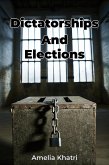The book argues that media coverage, despite its intent to inform, often introduces systematic biases, distorting political realities and polarizing public opinion. The book traces the evolution of media influence from partisan newspapers to the fragmented digital landscape, analyzing the shift from objective journalism to opinion-based news. It examines the economic pressures faced by news organizations and the psychological factors that contribute to selective exposure and confirmation bias.
By combining theoretical analysis with empirical evidence, the book critically evaluates news sources, and offers potential solutions through media literacy education and regulatory reforms. The book unfolds systematically, introducing theoretical frameworks, analyzing specific examples of media coverage in past and present elections, and exploring the consequences of media bias on voter turnout and policy debates.
Drawing on insights from political science, communication studies, psychology, and sociology, "Media Bias Elections" offers a comprehensive perspective on media influence, making it a valuable resource for students, researchers, journalists, and anyone seeking a deeper understanding of the relationship between media and politics.
Dieser Download kann aus rechtlichen Gründen nur mit Rechnungsadresse in A, B, BG, CY, CZ, D, DK, EW, E, FIN, F, GR, H, IRL, I, LT, L, LR, M, NL, PL, P, R, S, SLO, SK ausgeliefert werden.









